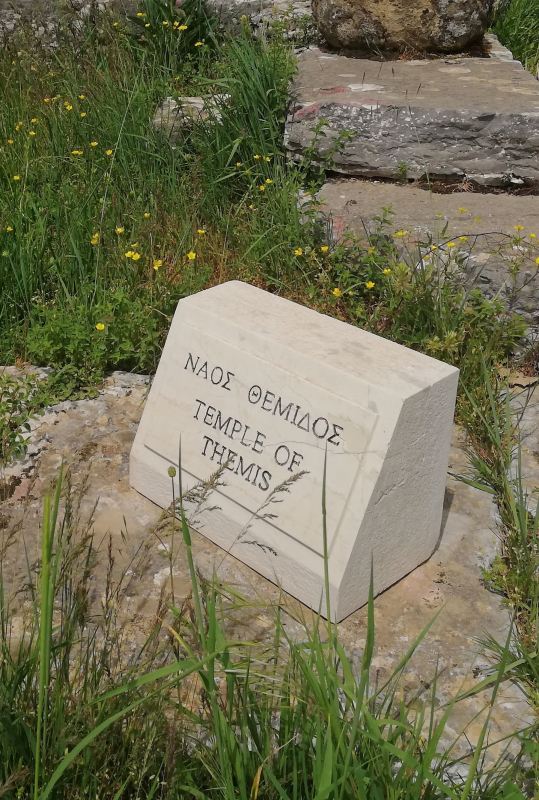Themis was the daughter of Ouranos (Heaven) and Gaia (Earth). She told Zeus not to marry Metis, because the child of that union would be more powerful than Zeus himself; she agreed with him that the Trojan War was desirable in order to lighten an overburdened Earth; and she finally ended up marrying Zeus after he transformed his first wife into a fly and swallowed her. Themis played a very important role in Dodona. She was called Naia alongside Zeus and Dione (the owners of the sanctuary), so archaeologists have placed her temple right next to that of Zeus. It is a simple building with a frontal colonnade with four Ionic columns. A large altar stood in front of the temple.

6. Temple of Themis
Dodona is far from almost all the major urban centers; so if you were going to walk or ride your donkey all the way up here, you had better know how to ask your questions when Zeus was all ears.
Stories
The housefly
How to ask a question from the gods
The lead tablets used by the supplicants to ask their questions reveal the deities worshipped at Dodona. There are thousands of tablets containing many thousands of queries. Initially the visitors submitted their questions orally but later on they wrote them on thin lead tablets, folded or rolled them up carefully, and carved a characteristic sign on the outer surface. The priests received them and pulled a lot with the positive or negative answer of the gods. After the divination assistants unfolded the tablets and erased the question to make way for a new question. Most queries are addressed to Zeus but others concern Apollo, Demeter, Aphrodite, Herakles, or Themis.
Yes or no
Most questions that appear on the surviving lead tablets were posed by men; women and couples appear less often. The queries reveal a private world of anxiety that could only be assuaged by the gods. Marriage, children, hopeless love, debts, migration, troublesome relatives, sickness, professional advancement, absence; personal matters far outnumber political questions. Since the answer was usually a simple yes or no (or the name of a god), visitors had to phrase their question very carefully if they wanted a useful response. Most tablets were written in the Doric dialect spoken in the regions near Dodona, but there are also texts in the Attic-Ionic, Thessalian, and Boeotian dialects.
The pillows
Dodona was always somewhat isolated and distant from major urban centers, but this did not prevent supplicants from undertaking an arduous journey in order to consult Zeus about matters of utmost importance. Agis asked Zeus and Dione about his coverlets and the pillows. Did he lose them himself or did someone stole them? Aescylinos was unsure about an appointment; should he visit Tisaldes? The answer was negative. He should not sail. The people of Dodona came with a meteorological question; did the god cause the wintry weather because someone was impure? And two people wanted to know if the slave Sindos actually stole the flowers.
Powered by Clio Muse Tours